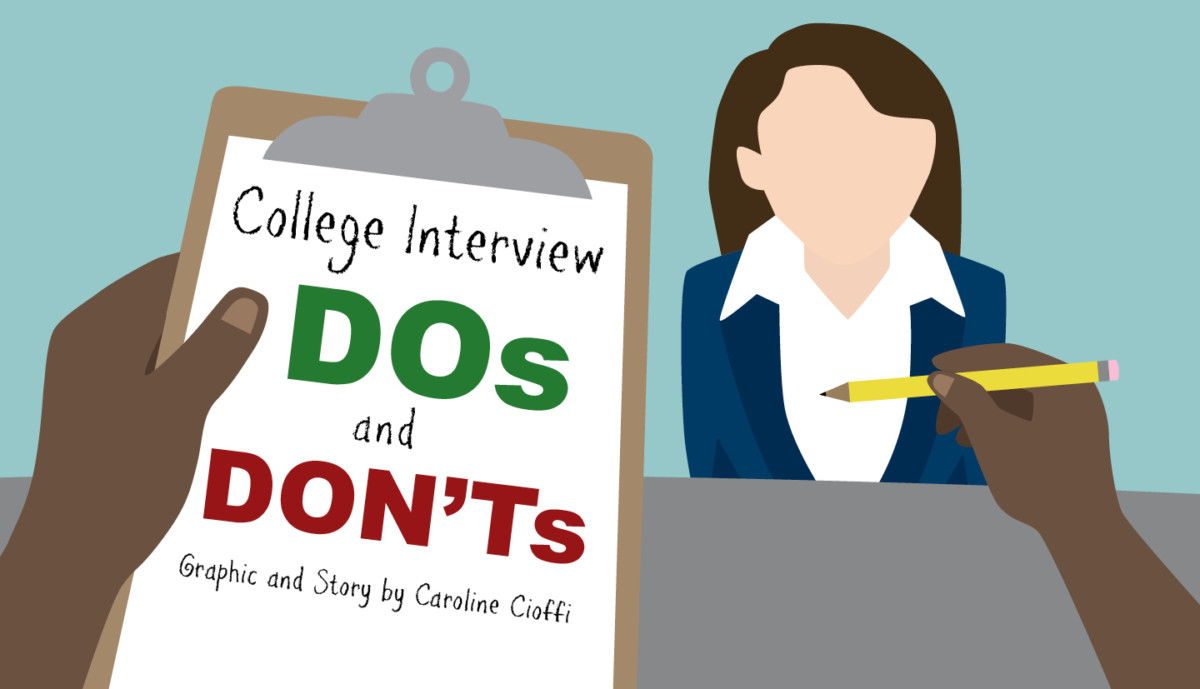Caroline Cioffi, Editor-in-Chief
@cciofficourant
With the help of websites like the Common Application, students are now able to submit more college applications than ever before. According to the Common App website, almost 3.5 million applications were submitted in 2017. This was a 20% increase from 2016 and this trend is expected to continue in 2018. With top colleges seeing record numbers of applicants, students are searching for ways to make their application stand out. For some students, a successful alumni interview could be the key.
 According to Cynthia Rivera, the School Counseling Department Chair, a positive note from an alumni interviewer could help a student’s application stand out. “Often times, the interviewer submits a report,” Ms. Rivera said. “They’ll make a note of a certain comment or something you said that sparked the interviewer’s interest. If they really like someone, it could sway the individual reading the application.”
According to Cynthia Rivera, the School Counseling Department Chair, a positive note from an alumni interviewer could help a student’s application stand out. “Often times, the interviewer submits a report,” Ms. Rivera said. “They’ll make a note of a certain comment or something you said that sparked the interviewer’s interest. If they really like someone, it could sway the individual reading the application.”
Having conducted many practice alumni interviews, College and Career Center Coordinator Susan Carroll has created a procedure to help students prepare for their interviews. “You have to start off by researching the interviewer,” Ms. Carroll said. “It’s important to know their age; for example, a younger alum might treat the interview one way while an older alum might be more formal.”
Next, students should conduct research in order to be knowledgeable about the school itself. “One of the biggest mistakes students make is that they don’t prepare for the interview as far as knowing the college where they’re interviewing,” Ms. Carroll said. “This is an interview and, at this point, you should know specifics about the school. You should spend time on their website and research a department that you’re interested in.”
Ms. Carroll also suggests that, in addition to knowing about the school, students should be prepared to reflect and answer questions about themselves. “Colleges are interested in accepting kids who are mature and will be able to handle college life,” Ms. Carroll said. “You have to know yourself. When an interviewer asks who you admire, you should know that.”
 Once this initial research is complete, Ms. Carroll suggests that students consider what they will wear to the interview. “Whether it’s a boy or a girl, my first question is always ‘What are you going to wear?’” Ms. Carroll said. “It’s important to look put together and professional up to a point but you still want to look like a high school student. And you also want to be comfortable.”
Once this initial research is complete, Ms. Carroll suggests that students consider what they will wear to the interview. “Whether it’s a boy or a girl, my first question is always ‘What are you going to wear?’” Ms. Carroll said. “It’s important to look put together and professional up to a point but you still want to look like a high school student. And you also want to be comfortable.”
When it comes time for the interview, students should speak in a way that is organized and conveys a central theme about themselves. “What message do you want to leave with the interviewer?” Ms. Carroll asked. “Perhaps, you tell the interviewer that you want to be a doctor someday. Well, maybe you have done and EMT class and volunteered at a hospital. In other words, medicine is the stream that runs through all of those things and you communicated that in an organized manner.”
Following the interview, Ms. Carroll suggests that students send a handwritten note thanking their interviewer. “You always end with the knowledge that you are going to write a formal thank you note,” Ms. Carroll said. “If you are at the school, get a business card from them. If you have already communicated via email, then an email thank you is fine but a handwritten one is still even better.”
If, however, an interview does not go well, it will not be detrimental to students’ admission into that school. “While a good interview can get you over the mountain, so to say, a bad interview isn’t going to push you down the mountain,” Ms. Carroll said. “A bad interview is just going to leave you in the same place.”
On the other hand, a positive interview experience could help a student’s application stand out during the admissions process. “I do think the interview makes a difference for some,” Ms. Rivera said. “The person who gets the report is human and, if they hear something really good, it may make them look at the student in a different way. So, if you’re offered an interview, you should definitely prepare for it and take advantage of the opportunity.




